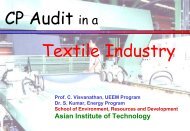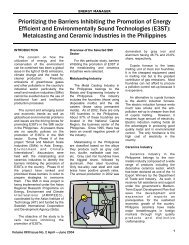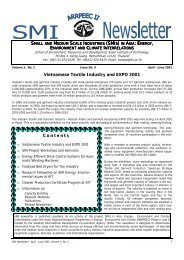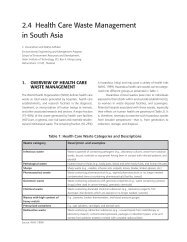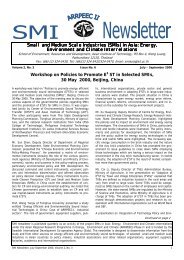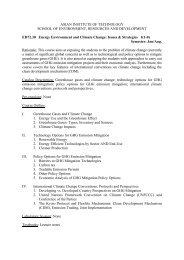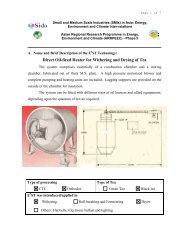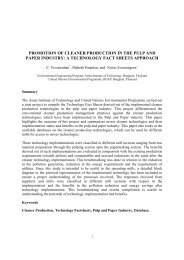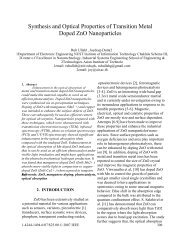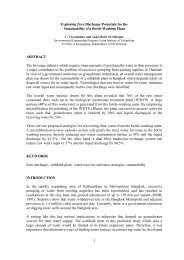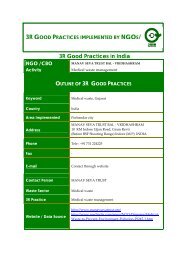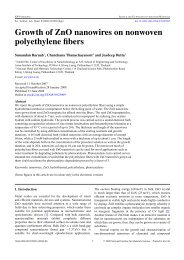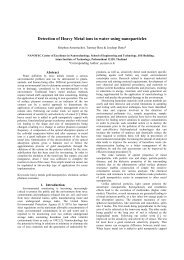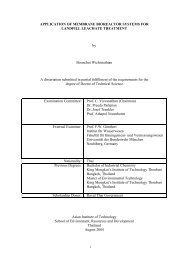A Gap Analysis in Selected Asian Countries, 3R Knowledge Hub ...
A Gap Analysis in Selected Asian Countries, 3R Knowledge Hub ...
A Gap Analysis in Selected Asian Countries, 3R Knowledge Hub ...
You also want an ePaper? Increase the reach of your titles
YUMPU automatically turns print PDFs into web optimized ePapers that Google loves.
76<br />
<strong>3R</strong> <strong>Gap</strong> <strong>Analysis</strong> and F<strong>in</strong>d<strong>in</strong>gs<br />
The sales of electrical home appliances such as<br />
televisions, refrigerators, wash<strong>in</strong>g mach<strong>in</strong>es<br />
and air conditioners cont<strong>in</strong>ued to <strong>in</strong>crease<br />
from 5.6 million units <strong>in</strong> 1990 to 7.8 million<br />
units <strong>in</strong> 2000, account<strong>in</strong>g for a 40% growth. In<br />
2000– 2004, sales decreased to 5.8 million<br />
units, with a reduction of 25%. The reason for<br />
this decrease is ma<strong>in</strong>ly attributed to the<br />
saturation of households with the appliances.<br />
The highest rates of obsolescence among the<br />
four waste items were obta<strong>in</strong>ed dur<strong>in</strong>g 2000–<br />
2005 at 19% and 14% for air conditioners and<br />
Televisions respectively. The volume of home<br />
appliances collected and treated <strong>in</strong> Korea is<br />
presented <strong>in</strong> the figure below.<br />
E-Waste Recycl<strong>in</strong>g and disposal <strong>in</strong> Korea<br />
Source: www.3rkh.net<br />
In 2006, the Government of Korea fixed<br />
mandatory recycl<strong>in</strong>g rates for Televisions (13%),<br />
refrigerators (13%), wash<strong>in</strong>g mach<strong>in</strong>es (23%)<br />
etc. Moreover, for mobile phones, audio<br />
equipments, copy mach<strong>in</strong>es and facsimiles the<br />
rate of mandatory recycl<strong>in</strong>g was fixed at 15%,<br />
13%, 8% and 8%, respectively.<br />
After the establishment of recycl<strong>in</strong>g centers by<br />
the electronics <strong>in</strong>dustry <strong>in</strong> 1998 <strong>in</strong> Korea,<br />
treatment and recycl<strong>in</strong>g has been cont<strong>in</strong>u<strong>in</strong>g for<br />
waste such as refrigerators, wash<strong>in</strong>g mach<strong>in</strong>es<br />
and air conditioners. Recycl<strong>in</strong>g centers are now<br />
be<strong>in</strong>g operated at three locations by three major<br />
electronic companies, handl<strong>in</strong>g a total amount<br />
of 880,000 units/year.<br />
F<strong>in</strong>d<strong>in</strong>gs<br />
The recycl<strong>in</strong>g of waste electronic home<br />
appliances has been performed successfully,<br />
due to the implementation of the EPR system <strong>in</strong><br />
2003. Three ma<strong>in</strong> items: refrigerators, wash<strong>in</strong>g<br />
mach<strong>in</strong>es and air conditioners, are be<strong>in</strong>g<br />
recycled at the recycl<strong>in</strong>g centers established by<br />
domestic electronic companies, and Televisions<br />
are be<strong>in</strong>g commissioned to private CRT<br />
recyclers.<br />
Korea has enforced the Extended Producer<br />
Responsibility (EPR) Law s<strong>in</strong>ce 2003. The law<br />
mandates that manufacturers, distributors and<br />
importers of consumer goods such as airconditioners,<br />
televisions and personal<br />
computers achieve the official recycl<strong>in</strong>g<br />
targets or pay f<strong>in</strong>ancial penalty.<br />
GAPS FOR IMPLEMENTATION OF <strong>3R</strong><br />
TECHNOLOGY GAPS<br />
Korea is one of the <strong>Asian</strong> countries with<br />
tremendous economic growth rates on par<br />
with some of the nations <strong>in</strong> the European<br />
Union. The country has been able to<br />
achieve its development goals through the<br />
use of appropriate technology. The<br />
rightful use of appropriate and advanced<br />
technology has helped the country be<br />
pioneers <strong>in</strong> semiconductors, wireless<br />
telecommunication equipments, motor<br />
vehicles, computers, steel, ships and<br />
petrochemicals. The upstream manufactur<strong>in</strong>g <strong>in</strong><br />
Korea adopts advanced technologies. However,<br />
an assessment of technologies <strong>in</strong> downstream<br />
waste handl<strong>in</strong>g and disposal is essential to<br />
implement <strong>3R</strong>-based solutions. The table<br />
presents an overview of the technologies used<br />
for waste management <strong>in</strong> Korea.<br />
MANAGEMENT ASPECTS<br />
Korea is the second <strong>Asian</strong> country to be a<br />
member of the Organization for Economic<br />
Cooperation and Development. The country<br />
became an official member <strong>in</strong> 1996. This clearly<br />
<strong>in</strong>dicates that the country has been adopt<strong>in</strong>g<br />
proactive management and technological<br />
measures aimed at develop<strong>in</strong>g its economic<br />
status. With well-def<strong>in</strong>ed policies, enforced<br />
legislation and <strong>in</strong>ternational cooperation<br />
<strong>in</strong>itiatives, the country has been progress<strong>in</strong>g at a<br />
steady pace.



